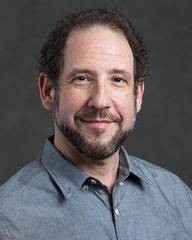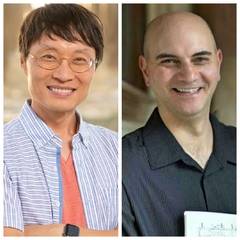|
Back
Mr. Berman’s Complicated Planet New York
BargeMusic
11/05/2023 -
Dana Brayton: A Little Traveling Music
Lei Liang: My Windows
Maurice Ravel: Miroirs: 3. “Une barque sur l’océan”
Kareem Roustom: Five Aleppo Songs
Arson Fahim: Song from a Dreamland (World Premiere)
Paul Desenne: Fiesta en Caraballade
Anthony David: Middle Passage
Betty Olivero: Sofim (Endings)
Niloufar Nourbakhsh: You Shall Know the Brilliance of the Dawn (New York Premiere)
Donald Berman (Pianist) 
D. Berman (© Tufts University)
“Music in the soul can be heard in the Universe.”
Lao Tse
“Music doesn’t lie. If there is something to be changed in this world, then it can only happen through music.”
Jimi Hendrix
If only the great Donald Berman could take control of today’s lunatic globe! In a single hour, he held together artists from Syria and Israel, from Venezuela to Afghanistan, America to China. Artists whose talents, inspiration, expertise and outlook transcend nationality, overcome ethnic warfare and prove that art can put politics into the garbage can.
Of course Donald Berman hardly needed a link to show his stuff. I had heard the great pianist several times at BargeMusic. And each recital brought forth new and established works, all played with a unique mastery. Unique because one doesn’t need to marvel at his keyboard mastery. Omitting the usual physical fireworks of more publicly celebrated pianists, his ebullience, technique and taste speak (or rather is heard) for itself.
Mr. Berman’s official biography says it best. He is “one of the chief exponents of new works by living composers, overlooked music by 20th Century masters and recitals that link classical and modern repertoires.”
Quite a challenge. This afternoon, the only 20th Century master from a nonet of unfamiliar and premiere works was Maurice Ravel. And while one had problems assaying the unfamiliar, Mr. Berman’s unassuming genius for the French work was unassailable.
He controlled those fluctuating rhythms and sweeping arpeggios from “Une barque sur l’océan” (a. k a, this afternoon “A Barge on the East River”) with his usual unassuming brilliance.
The other eight works by the planet of composers were performed without intermission over 75 minutes, most having been written for the pianist himself. Yet without a score, with only Mr. Berman’s terse descriptions the works merged together. Without exception, they were all dissonant, difficult, relatively succinct, seemingly atonal. They each had jolting variegated rhythms, they all had a plethora of trills and a pedaled palette of unusual sounds.
Yet for half of them, composers and amorphous titles could have replaced each other.
Yes, this is unfair, since Mr. Berman knew them well and played them with the same grandeur that he played the Ravel. Yet for this uninitiated listener, only the visually projected (i.e. extra‑musical) works made for more than respectful sense.

L. Liang/ K. Roustom
Mr. Berman accidentally put forth the image for the Dana Brayton’s jaunty A Little Traveling Music. The pianist tripped for a second before reaching the Steinway. That led to a work which showed a whole encyclopedia of travel by foot. The music galloped and tripped, strode, crept and jumped, clomped and ran, fell, got up again and ambulated through an imaginary landscape. Great fun.
The next two pictures came from out of Lei Liang’s My Windows. A heavenly‑like simplicity for Tian and a shattering rain of glowing rays from Seven Rays of the Sun both were picturesque, they both offered landmarks for understanding.
I was personally impacted by Aleppo Songs by the Syrian composer Kareem Roustom. Personal because half a century ago, I spent a week in–then undemolished–Aleppo, examining the Medieval pre‑Arabic structures. And yes, in Mr. Roustom’s Antiochian Hymn, one could hear the Eastern Orthodox liturgy. Stylized, yes, but with a mendicant’s simplicity.
The last quasi-picture was that of drumming and festivity, of riotous dancing and an earthly joy. The late Venezuelan composer Paul Desenne composed his Fiesta en Caraballade for the seaside town almost destroyed by floods a decade before this work. (I had to Google that info.) Yet the music kept it alive.

N. Nourbakhsh/B. Olivero (© Marina Berio)
The other works were expertly composed, yet one had difficulty finding a landmark, a point of reference. Afghani composer Arson Fahim, today a student of Mr. Berman at Bard College, attempted to reconstruct his pre‑Taliban Afghan music in a complex style, not quite Afghani. Andrew Davis and Betty Olivero offered equally complex music. Ms. Olivero, presently residing in Florence was a student of Luciano Berio. (His wife took her picture shown above.) Berio was a man of unusual styles, ranging from reconstructions of Schubert to re‑imaginings of Samuel Beckett to Boulez cloning (but with more personality). Ms. Olivero hid her Jewish themes into a schemata of trills and wild glissandi.
Finishing with Niloufar Nourbakhsh: You Shall Know the Brilliance of the Dawn, I tried to find a relation to her excellent piano work Fixed. Instead, from the poetic title, one heard again a work which was concise, brilliantly composed and yet–perhaps from so much unfamiliar music (Mea culpa)–somewhat cold.
One commonality from almost all the composers this afternoon were tragedies. Syria is demolished, Afghanistan is a fanatic hellhole, Iran a misogynistic inferno, Venezuela is chaos, the idyllic Chinese pictures are memories from a dictatorial would‑be empire, Israel today is...well, I won’t go into today’s crisis.
What the composers did was to develop dreams from the nightmares. Donald Berman brought these dreams to a technically bewitching reality.
Harry Rolnick
|